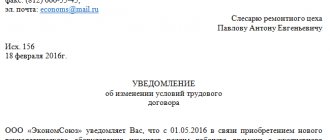Stages
Changes in significant working conditions in the Republic of Belarus, Russia and some other neighboring countries presuppose:
- Drawing up an additional agreement. It will act as an annex to the contract. In this case, the agreement is drawn up in 2 copies.
- Issuing an order to change essential working conditions (a sample document is presented in the article).
An employee of the enterprise begins to perform production tasks according to the new rules from the moment the additional agreement is signed. agreement or from the date specified therein. There is one important point to note here. Even if the employee agrees to change the essential working conditions, without drawing up an agreement and issuing an order based on it, he should not begin to perform his duties.
When a procedure is allowed: grounds, general rules
The general rules and grounds for making changes to the initially defined terms of the contract are regulated by Article 74 of the Labor Code of the Russian Federation, according to which such a procedure is allowed only by mutual agreement of the parties: in the cases described below, the terms of the signed employment contract can be legally changed:
- Unilaterally - the employer has the right to adjust the contract in connection with a significant restructuring of the enterprise and the actual impossibility of continuing cooperation under the given conditions.
In this case, it is necessary to notify the employee (at least two months in advance), inform about the reasons for the changes and offer an alternative that matches his professional skills. If a refusal is received, the employment agreement is terminated (clause 1, part 1, article 77 of the Labor Code of the Russian Federation). - By agreement of the parties - in accordance with Art. 72 of the Labor Code of the Russian Federation, an employee has the right to submit an application, drawn up according to the general procedure established for filling out business papers, addressed to the manager with a request to adjust the contract, indicating the reasons, nature and timing of the expected execution. If the answer is positive, an additional agreement to the main document is signed (you can read about how to draw up an additional agreement to an employment contract by agreement of the parties in connection with a change of surname here).
- For all employees - without affecting the labor function, upon provision of evidence that the organization has undergone significant modernization for organizational and technological reasons.
- For one employee - in accordance with the general procedure specified in paragraph 1.
To solve your problem, contact our lawyer via online chat. #Stay home and good health to you!
Ask a Question
Leadership Initiative
As Article 32 of the Labor Code indicates, changes in essential working conditions are permitted by the employer if technological or organizational innovations have been introduced into the activities of the enterprise. Moreover, they must be documented and justified. Organizational changes in significant working conditions require adjustments to the staffing table, schedule, and content of the collective agreement. The management of the enterprise may decide to purchase new equipment or switch to innovative technologies. Such changes are called, accordingly, technological. In such situations, the legislation establishes a certain procedure for the actions of the manager. The employer issues an order to introduce technological or organizational innovations. After that, within 1 month. before the latter enter into force, sends each employee affected by them a notice of significant changes in working conditions. In the Republic of Belarus, Russia and a number of other neighboring countries, liability is provided for failure to comply with the rules.
Guarantees for employees
The legislation provides for a number of legal instruments to protect the interests of employees. Thus, upon receiving notification of a change in significant working conditions, an employee can respond within 1 month. This is quite a long period of time during which an employee can weigh all the pros and cons of the upcoming changes. If a citizen decides to refuse to change significant working conditions, the employer is obliged to provide him with another similar job (position) at the same enterprise. If this is impossible to do (there are no free places, for example), the employee resigns of his own free will. It should be said that the employer cannot make changes to the essential working conditions during the 1 month allotted for the employee to make a decision. Otherwise, he will have to pay compensation to the employee. The compensation is the amount of earnings for the specified month.
Employee Notification
An employer registered as a legal entity is required to notify an employee of proposed changes in his contract 2 months in advance, and an individual entrepreneur - 2 weeks before their entry into force .
The notification of changes in the terms of the employment contract contains the following required information:
- reasons (indicating articles of the Labor Code of the Russian Federation confirming the legality of the employer’s actions);
- information about how and who else’s contracts will change;
- information about the employee authorized to monitor the execution of the order;
- deadlines for notifying employees about changes.
Proof of familiarization of the employee with the order is his signature indicating the date. The document is then recorded in the order journal and left for permanent storage in the company.
FOR REFERENCE: At the end of the notification, experts advise adding the following sentence: “I have read the notification, the essence is clear to me. I received one copy in person.” Below there should be a form (changes to the employment contract), in which the employee will sign, indicate the current date, full name.
You can sample a notice of change in the terms of an employment contract.
Reasons for innovation
The Labor Code requires justification for significant changes in working conditions. The introduction of innovations into work is allowed due to production, economic, and organizational necessity. Among the main reasons are the following:
- Installation of new machines.
- Introduction of a new form of organization of activities at the enterprise.
- The company's transition to a multi-shift mode.
- Computerization (automation) of production.
- Introduction of resource-saving work methods.
- Repurposing of production.
If the employer has not provided evidence (justification) of significant changes in working conditions, the Labor Code of the Russian Federation recognizes the dismissal mentioned above as illegal. Accordingly, very unfavorable consequences for the employer may occur. As a rule, the body authorized to resolve labor disputes charges the management of the enterprise with the obligation to restore the working conditions of the personnel that existed before. Moreover, the employer will have to pay compensation to the employee for forced absences or performing lower-paid production tasks. The justification of innovations is therefore the responsibility of the employer. The reasons why certain changes are introduced are indicated in the order to change essential working conditions. Each employee affected by the changes must be familiarized with this document against signature.
Order to change working conditions (sample)
The order must include the following information:
- provide justification for the introduction of innovations into the work process;
- provide a list of employees to whom they are related;
- appoint responsible persons and give them the necessary instructions.
Further, everything will depend on the way in which the changes in essential UTs occur. If they are implemented in agreement with the employee and are not related to changes in organizational or technological working conditions, then an additional agreement to the employment contract is drawn up. Otherwise, written notice to employees will be required.
To complete the process, you will need to familiarize all employees affected by the order with the contents. This must be done within two months.
What working conditions are considered essential?
Their list is fixed by law. However, the list is not closed. Essential conditions, depending on certain circumstances, include:
- The right to pension benefits.
- Distance of the enterprise from the place of residence.
- Possibility to use official transport to get to work.
- Carrying out activities in a specific unit (workshop, department, service) stipulated by the employment contract.
- Possibility to use holidays and weekends.
Changes in the essential terms of the employment contract
Order No. In connection with the need to change the organizational (technological) working conditions of division employees due to (indicate the reasons that prompted changes in work) and in accordance with Article 74 of the Labor Code of the Russian Federation, I ORDER: 1. Change the organization of work of the following employees: divisions, (indicate the full name of the unit) establishing the following working conditions for them: , (indicate what the new conditions of labor relations are) and also changing the following essential conditions of employment contracts with them: (indicate what exactly will change for each employee from the conditions listed in Part 2 of Article 57 of the Labor Code of the Russian Federation) with their continuation of work without changing their labor function. - within a period of
Qualification indicators
In some cases, the list of essential conditions includes the employee’s rank. At the same time, it is stipulated that a change in the qualification indicator may lead to the transfer of an employee. Meanwhile, such a condition contradicts the requirements of the law. The employer does not have the right to lower the grade on the basis of the Labor Code. The qualification indicator can act as one of the key points of the contract, for example, in the case of introducing 8-bit (instead of 6-bit) qualifications throughout the enterprise as a whole. In this situation, the provisions of the legislation on adjusting the name of a position or profession should be applied by analogy. Conditions about the labor function, the employer, and the place of work cannot be regarded as significant (although undoubtedly important). Their adjustment is recognized, as a general rule, as a translation. A change in the terms and conditions of a workplace is considered a relocation.
Parts of an order
Despite the fact that the paper does not have a clear, prescribed form in the law (it talks about free form of presentation), it is advisable to adhere to the predetermined structure of the order. An official document requires a clerical type of presentation of information.
At the top of the order to change the terms of the employment contract, in the middle, the full name of the company that issues it is always written. Just below is the date and document number. After the word “Order,” the reasons that prompted the leader to issue it are always listed. It could be:
- Conducted certification of working conditions.
- Completion of advanced training courses by the employee.
- Employee statement.
- Injury received by the employee, etc.
After stating the reasons, the document must clearly and point by point record what exactly will change in the terms of the employment contract. This could be time, place, responsibilities, payment, tariff rate, etc.
The order must also indicate:
- Dates from which changes occur. Moreover, for each item of the order the date is written separately.
- The fact of sending a written notification to the employee about the release of the order.
- The personnel officer or other official responsible for communicating changes to the employee. And also which of the company’s employees is obliged to draw up additional agreements to the employment contract so that the changes are recorded there too.
- Who controls the fulfillment of the requirements set out in the document. In most cases, the manager retains control.
At the end of the document, the basis for the changes being made is indicated. This could be an employee statement or any other document. But this paragraph is not a mandatory part of the order.
At the very bottom of the completed sheet is the signature of the head and the seal of the organization. Also, all persons who were mentioned in the text of the order must sign there. For example, HR manager, lawyer, HR officer, etc.
It is advisable to make two or three copies of the order. One of them is sent personally to the employee whose terms of the employment contract are changing. He must sign for its receipt.
In any case, the order number enters the company’s personnel records register. They relate to personnel documents. The shelf life of this document is 75 years.
Important point
If a position/profession is not only renamed, but also changes are made to the scope of the employee’s skills, knowledge, functions, responsibilities or rights, a transfer to another job occurs. It can only be carried out with the consent of the employee. The explanations of the Ministry of Labor and Social Protection repeatedly emphasize that the renaming of a profession/position is carried out by a specially authorized government body or the Government. Only on the basis of acts adopted by these structures, the employer changes the names, and not at its own discretion.
Switch to contract
Often, when citizens go to work, they enter into an agreement with the employer for an indefinite period. Over time, it becomes necessary to make the transition with such employees to a contract. This process relates to an essential term of the contract. Typically, most of the key aspects of an employee’s professional activity are reflected in writing. This may be, in fact, an employment contract or an order (instruction) issued upon admission to the enterprise or subsequently. Such acts, in particular, stipulate salary, features of combining professions, performance of production tasks part-time or at home (remotely), job title, etc. Changes in key conditions are carried out in the same order in which they were determined. First of all, adjustments are made to the agreement or order of the manager. However, there is a category of changes for which an order is not issued. For example, when switching from a regular schedule (not specified for a specific employee in the agreement) to a shift schedule, it is enough to familiarize the employee with the new schedule.
What to do if an employee refuses to change working conditions?
If the employee does not agree to make adjustments to the contract, the law obliges the employer to offer him another vacancy in the same area by sending written notice.
This may be work requiring similar or lower qualifications.
The main thing is that it must correspond to the person’s capabilities, based on his state of health.
If the employee agrees to the proposed conditions, he signs an agreement with the employer.
Then the order is issued. If an employee refuses to work or the employer cannot offer him a new position that does not contradict the law, the contract between them is terminated on the basis of clause 7, part 1, art. 77 Labor Code of the Russian Federation.
Practice shows that often it is the employer who has the desire to change the terms of contracts with employees
. If they agree to the adjustments, an agreement is signed. The law allows the employer to adjust working conditions according to his decision in the event of reorganization or change in technical conditions of production. However, if the employee disagrees, management is obliged to provide him with a new job.
Employee refusal
It entails termination of the employment contract. If the employee did not send a refusal to the head of the enterprise, but was dismissed, then such actions are illegal and entail appropriate consequences. First of all, the employee is reinstated at work. The refusal must be made in writing. The document must indicate all mandatory details (name of the enterprise, full name of the director, information about the applicant). The text can be limited to the phrase “I refuse to change working conditions.” In addition, it is allowed to put a corresponding mark on the change order. In this case, you can limit yourself to one word “I refuse.” It should be noted that the presence of a refusal in the form of an independent document or signature on the order does not mean that the employee can stop working. As mentioned above, he is obliged to continue performing production tasks during the period allotted by law for notice (i.e. for at least a month).
Execution of additional agreement
occurs in the event of a change in the terms of the contract (,), as well as when the contract is terminated.
It must be drawn up in the same way as the contract itself
because it is part of it.
The additional agreement indicates the place, time of its conclusion, and data of the parties.
The first copy is signed by the employee, the second by the employer. The document has been kept in the company archives for 75 years
.
- Order to change the terms of the employment contract
This document must contain:
- general details of the parties (legal name, location, telephone number, employer’s INN/KPP, employee’s passport details);
- grounds for changing the content of the employment contract;
- nature of adjustments;
- an order to amend company documents (for example, local regulations);
- date of introduction of changes.
IMPORTANT:
the order has no legal force without the signature of the employees
who are responsible for its execution. The employer is obliged to register it in the order register and leave it for permanent storage.
Controversial issues
Dismissal of an employee is permitted only after the end of the month allotted for notification. In this case, the employee may insist on earlier termination of the agreement. If the employer fails to comply with the procedure for changing essential working conditions, the court has the right to adjust the date of dismissal so that the legal relationship is terminated at the end of the month. This provision applies if the employee is not subject to reinstatement. In some cases, the employee was notified of the changes but was terminated before the month's deadline. In such a situation, the court has the right to adjust the date of termination of the agreement taking into account the period remaining until the end of the month. Lost earnings are recovered from the employer. The powers of the court established by law thus make it possible to restore the violated order and protect the employee’s right to advance notice.
Specific situations
An employee cannot be subject to disciplinary punishment for refusing to continue working under changed conditions, since the law provides him with such a right. In a number of cases, in practice, employers force company personnel to continue working after the expiration of the one-month notice period, and employees who disagree are fired. Employers cite absenteeism or systematic violation of discipline as grounds for terminating a contract in such situations. What do the courts do in such cases? The authorities that resolve disputes believe that if the issue regarding the reinstatement of the employee is considered, it is revealed that absenteeism is associated with his refusal to work under changed conditions, and the citizen does not want to continue his activities, the wording of the dismissal can be changed. Accordingly, the order to terminate legal relations is executed based on the factual circumstances of the case.
How to obtain employee consent?
If an employee refuses to work under the proposed conditions, management is obliged to write him a letter offering:
- free vacancy (if available);
- work requiring similar qualifications;
- a vacant position that requires lower qualifications or is less paid, but is medically suitable.
IMPORTANT! The law obliges the employer to inform the employee about all vacancies in a certain area within 2 months. In written proposals, he must indicate the names of positions, conditions and amount of remuneration, as well as other factors indicated in Art. 57 Labor Code of the Russian Federation. Otherwise, the employee will be able to declare the procedure illegal through the court.











